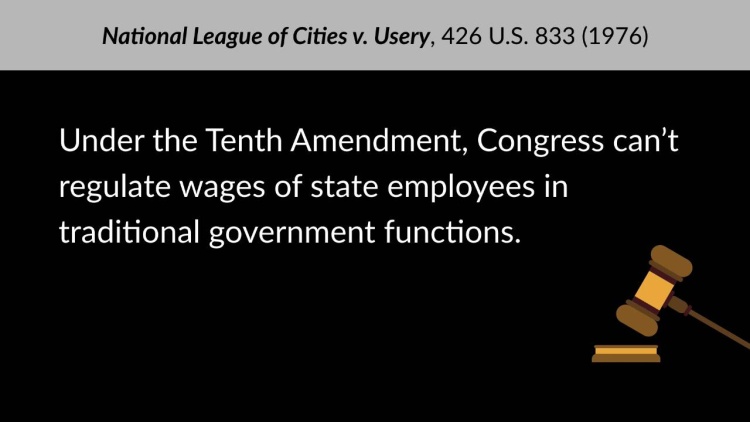Garcia v. San Antonio Metropolitan Transit Authority
United States Supreme Court
469 U.S. 528, 105 S. Ct. 1005, 83 L. Ed. 2D 1016 (1985)
- Written by Jamie Milne, JD
Facts
Congress passed the Fair Labor Standards Act (FLSA) in 1938. The FLSA includes minimum-wage and overtime provisions. In the 1976 case National League of Cities v. Usery (National), the United States Supreme Court held that the Commerce Clause did not give Congress authority to impose minimum-wage and overtime regulations as to state employees engaged in traditional government functions. Consequently, the relevant FLSA provisions did not apply to those employees. After National, the San Antonio Metro Transit Authority (SAMTA) (defendant) stopped abiding by the FLSA’s regulations. In 1979, the United States Department of Labor ruled that the FLSA continued to apply to SAMTA because SAMTA was not engaged in a traditional government function. SAMTA then sued the Department of Labor in federal district court, seeking a declaratory judgment that SAMTA was not subject to the FLSA’s provisions. Garcia (plaintiff) and other SAMTA employees simultaneously sued SAMTA, seeking backpay for overtime. The district court allowed Garcia to intervene in SAMTA’s suit against the Department of Labor. Applying National, the district court ruled for SAMTA, finding it was not subject to the FLSA’s provisions. Garcia and the Department of Labor appealed directly to the United States Supreme Court. The Supreme Court remanded the case for reconsideration in light of recently released precedent. The district court again ruled for SAMTA, and the Supreme Court granted certiorari.
Rule of Law
Issue
Holding and Reasoning (Blackmun, J.)
Dissent (O’Connor, J.)
What to do next…
Here's why 907,000 law students have relied on our case briefs:
- Written by law professors and practitioners, not other law students. 47,100 briefs, keyed to 996 casebooks. Top-notch customer support.
- The right amount of information, includes the facts, issues, rule of law, holding and reasoning, and any concurrences and dissents.
- Access in your classes, works on your mobile and tablet. Massive library of related video lessons and high quality multiple-choice questions.
- Easy to use, uniform format for every case brief. Written in plain English, not in legalese. Our briefs summarize and simplify; they don’t just repeat the court’s language.





